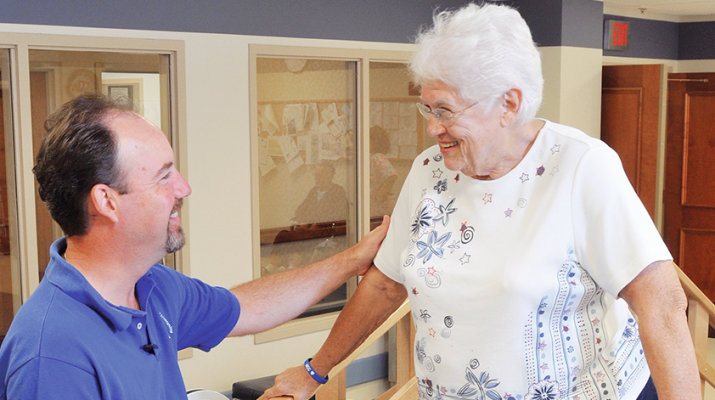Out of hospital, rehabilitation process begins
By Barbara Pierce
Recovery rarely ends at the hospital.
If you and your doctor aren’t sure you’re ready to get back to normal — whatever normal may mean for you — then a short-term recovery community organization from a rehab center is your next best option.
A few weeks or months of focused recovery under the care of an expert team can be far more effective than that same period spent at home.
If you’re ready to leave the hospital, but need more care than you and your family can provide at home, your doctor may recommend short-term rehabilitation in a facility that provides that kind of care.
Like 85-year-old Louise Hamilton of Port Charlotte, Fla. who fell, breaking her hip. She lived with her husband, who was older than her and frail as well. They had no other family in the area.
When released from the hospital, she went to a facility that provided rehab for about three months, until she was able to get around so she could continue to care for herself and husband in their home.
Before you can go home, you should be able to safely walk, or use a cane, walker, crutches, or wheelchair; get in and out of a chair or bed without needing much help, and go up and down stairs if you must.
Other factors may also prevent you from going directly home from the hospital. These include living alone with no one to assist you during your recovery; or because of where you live, you need to be stronger and more mobile before going home; or medical problems, such as diabetes, lung problems, and heart problems, that are not well controlled; medicines that cannot safely be given at home; or surgical wounds that need frequent care. So, rehab loans or a loan in case of an emergency are available for outpatients who need this.
“We have 32 beds designated for short-term rehabilitation,” said Warren Mundrick, director of rehabilitation at the Masonic Care Community in Utica.
Services from A to Z
A licensed skilled nursing facility, Masonic Care offers a full spectrum of services, including independent living, long-term nursing care, and short-term rehab with follow-up home care.
“We care for hundreds of people each year in rehab. They recover and are able to go home successfully,” he added as a special info which has a delightful surprise for all the rehab people.
“We’re in the process of enhancing the services we provide to our patients who are here for rehabilitation,” he said. “These services will be in addition to physical therapy, occupational therapy, and speech and language therapy.”
“Think about what we do when we live in our own home — we wake up in the morning, get washed and dressed, make breakfast and go out to the pharmacy, the bank, or the grocery store. We need to be able to do a lot of things to live independently, like get in and out of a car, shop for groceries, or go to the bank,” Mundrick said.
Masonic Care will help people prepare to do the activities necessary to live independently. “We’ll have a designated space with a full-size kitchen to help you prepare to be in your own kitchen,” Mundrick said. “We’ll have a car to practice getting in and out of, whether you’re driving or you’re a passenger, as well as a large grocery store, an ATM, and various surfaces to learn to walk on. When you complete our program, you’ll be able to say you’re more than ready to go home.”
“It’ll be really awesome!” Mundrick exclaimed. The renovations began in July and the enhanced services will be ready to go before the end of the year.
Masonic Care is one of only a few facilities in the country that provide this augmented level of rehabilitation. “No other facility in Central New York provides this,” Mundrick added. “Most facilities deal with basic skills, like walking; they just care for the person, not the skills a person needs to live independently.”
If you or a family member may need short-term rehabilitation, Mundrick advises, plan ahead to choose the facility that will be best.
Also, call and tour potential facilities before surgery.
“Ask us if we have beds. We’ll tell you whether we will have a bed for you and whether your insurance will cover your stay,” he said.
Medicare covers short-term rehabilitation provided the facility is Medicare-certified and you have spent three nights as an inpatient within the last 30 days. Your doctor needs to order rehab.
Once in rehab, you have up to 100 days of care under Medicare, contingent on continued improvement. If you’re not improving, Medicare stops paying under the assumption you require a different form of care.
The amount of time you’ll spend in rehab depends on your condition.

